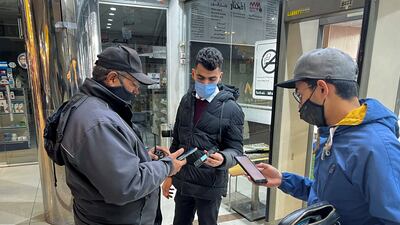At least nine Jordanian ministers have been infected with Covid-19 as almost a third of the country's PCR tests this week have been positive .
Hotel occupancy rates are at only 7 per cent, official data showed.
Jordan, which has a population of 10.7 million and is a main recipient of US aid, is being hit hard by the pandemic and its economy has been slowing down for more than a decade.
Authorities abandoned most coronavirus restrictions in the middle of last year, blaming the coronavirus for a 2020 recession.
The country has been in what officials describe a fourth wave of the pandemic since November. Unemployment is hovering around an official record high of 24 per cent.
Latest official data on Wednesday showed that 29 per cent of the 63,000 people who took PCR tests in the previous 24 hours tested positive.
Faris Hadad, head of the Parliament’s health committee, told state television that the infection of nine ministers as well as "a large number of Parliament’s staff" forced the postponement of a session this week.
Authorities said that the health and planning ministers were among those infected in the Cabinet of 32, blaming the Omicron strain for increased infections across the country.
Officials say that most of the infections are not life-threatening, citing a 40 per cent coronavirus bed occupancy at hospitals.
Senior health official Adel Al Belbesi said that if Jordan was hit by a more severe variant than Omicron, “the hospitals would have been full”.
He said the rate of increase in infections has been rising since the beginning of the year, with Omicron accounting for 80 per cent of the infections in the capital, Amman.
The Royal Medical Services, which runs King Hussein Medical City where thousands go daily for treatment, said on Thursday it has banned visits to patients for two weeks, starting on Friday.
The Health Ministry on Wednesday reported 13 deaths from Covid-19, bringing the total of officially recognised deaths from the pandemic in the kingdom to 13,248.
Traffic in Amman has been less congested than usual. In the newer part of the city in the west, there were only a couple of occupied tables at one of the capital’s most expensive restaurants at lunchtime on Thursday.
Sameh, the head waiter, said fear of infection has been a factor behind the slow business.
"Some regular customers have also become more careful about spending money,” he said.
The government said the economy grew 2 per cent last year, the same proportion it retracted the year before. It cited a partial rebound in tourism as helping to achieve economic growth.
But Hotel Association data shows hotel occupancy at about 7 per cent. One travel agent said the reintroduction in December of negative PCR testing requirements to enter and leave Jordan have sharply undermined business.
"Not only foreigners became afraid to come lest they get stuck, but Jordanians became also afraid to leave because they might not be able to come back," the agent said.
But restaurants and cafes in Jabal Al Weibdeh, an established district in the relatively new capital, were somewhat full. The influx of foreign students who have come to Jordan to study Arabic in the past decade have helped to breath life in the area.
A theatre stage manager who was having coffee at one cafe said a play he put together is to be shown at the Royal Cultural Centre in Amman this weekend, despite some delays and cuts.
“So many actors and staff have been infected,” he said. “It has been a nightmare but there will be three performances.”


